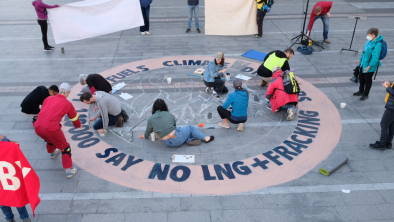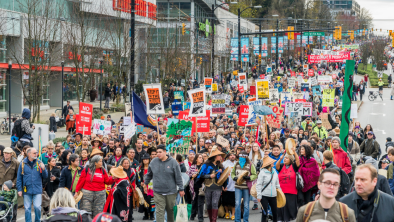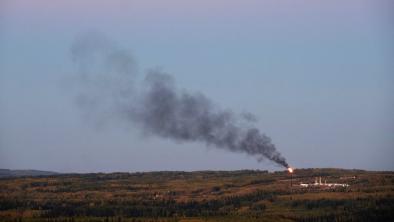Deadline approaching on Site C
Saturday, November 23, 2013
ALASKA HIGHWAY NEWS
Monday is last day to file written comments
Public hearings on the proposed Site C hydroelectric dam are scheduled to start next month, but a number of environmental and First Nations groups say the timing of the hearings will prevent British Columbians from fully participating in the process.
The hearings are slated to kick off Dec. 9 in Fort St. John and continue throughout the Peace Region through the end of January, including hearings in Dawson Creek, Chetwynd, Hudson's Hope, Prince George and a handful of First Nations.
However, the Peace Valley Environment Association (PVEA) and the Wilderness Committee say holding the hearings over the holidays and during the New Year will likely deter a good number of residents across the province from registering to have their say about the project.
"Taking a process that is already fast tracked and putting it squarely in the holiday season is a cynical approach to getting around good decision making," said Joe Foy, who has led the Wilderness Committee campaign against Site C.
Since August, a federal and provincial joint review panel has been poring through BC Hydro's 20,000-page environmental impact statement on Site C. Hydro says it needs the $8 billion project to meet a 40 per cent increase in electricity demand over the next 20 years, as the province's population is projected to jump by a million people.
On Nov. 7, the panel announced the dates and communities set to host 26 hearing dates for the community and technical experts to speak to the proposal. British Columbians have until this Monday, Nov. 25, to file written submissions, long before the hearings are set to conclude Jan. 23.
"If a person in Boston Bar or Golden wishes to submit a written statement about how this might impact them, if they don't have it in by this coming Monday, it's not going on the public record," said Foy. "That seems to us to be really, really wrong."
Both Foy and Andrea Morison, coordinator of the PVEA, add that they are disappointed no hearings have been scheduled across the Lower Mainland, despite those residents having a high stake in the project as Hydro ratepayers and taxpayers.
"I've been told by people who live down in the Lower Mainland that they too are very upset and are concerned (about the impacts of the projects)," said Morison. "They've been very much excluded from participating in this process."
That mirrors the sentiments of at least one resident, Don Startin, who wrote to the panel Nov. 13 demanding a hearing in Victoria, the provincial capital, and all other major urban centres.
"The vast cost of this project will be born by all British Columbians, and the Peace River Valley belongs to all of us," Startin wrote. "We are all entitled to have our voices heard in the presence of the media and our peers with regard to the disposition of this unique ecosystem."
Lucille Jamault, a spokeswoman for the review panel, said the panel is hosting hearings near or in the communities most affected by the project. It will not be adding dates in the Lower Mainland.
She said the Nov. 25 deadline for written submissions is for anyone interested in the project, whether or not they live in the affected communities or plan to make an oral presentation at a hearing.
"Having all written submissions posted to the public registry by that date will allow the panel and all participants including the proponent, to have an adequate amount of time to review the information submitted to the panel ahead of the public hearing, and to be prepared to ask questions of participants during the hearing as needed," said Jamault.
Jamault noted the panel issued a draft of its hearing procedures for comment this fall.
The panel needs to hold public hearings in December and January to allow itself to complete its review within the eight-month time frame laid out between the federal and provincial governments, said Jamault.
The panel will hold three types of hearings during this process. They have been split into general sessions, where anyone who registers can present their views on the project and its potential effects; topic-specific sessions for experts with specialized knowledge to present information that addresses BC Hydro's environmental assessment; and community sessions with First Nation communities.
Both the PVEA and Wilderness Committee will make presentations at the hearings. Morison says the PVEA will have three experts speak on the agricultural, economic and socioeconomic consequences of the project.
However, she's disappointed the panel has only allotted an eight-hour general session in Fort St. John for local residents. While the panel will allow presentations of up to 20 minutes, that time frame doesn't allow for many people to speak, she said.
"For the diversity and the array of impacts and depth of these impacts that need to be addressed, I'm sure it will be very challenging for the panel to hear everything they need to hear," said Morison.
The environmental assessment is expected to wrap up in spring. Following the hearings, the panel will submit a report to the federal Minister of the Environment and the executive director of the B.C. Environmental Assessment Office. The federal government will make a decision on the project within six months of receiving the panel's report.
If approved, B.C. Hydro will build a 60-metre-high earth dam about seven kilometres south of Fort St. John, along with a 1,100-megawatt generating station. The dam's reservoir will extend about 80 kilometres to Hudson's Hope and flood about 3,400 hectares of mostly Class 1 and 2 agricultural land.
If built, Site C would be the third dam along the Peace River.
Photo: Joe Foy of the Wilderness Committee says holding public hearings on the proposed $8 billion Site C hydroelectric dam over December and January is a “cynical approach” to good decision making. Both the committee and the Peace Valley Environment Association fear area residents will be deterred from participating in the hearings because of the holidays.


